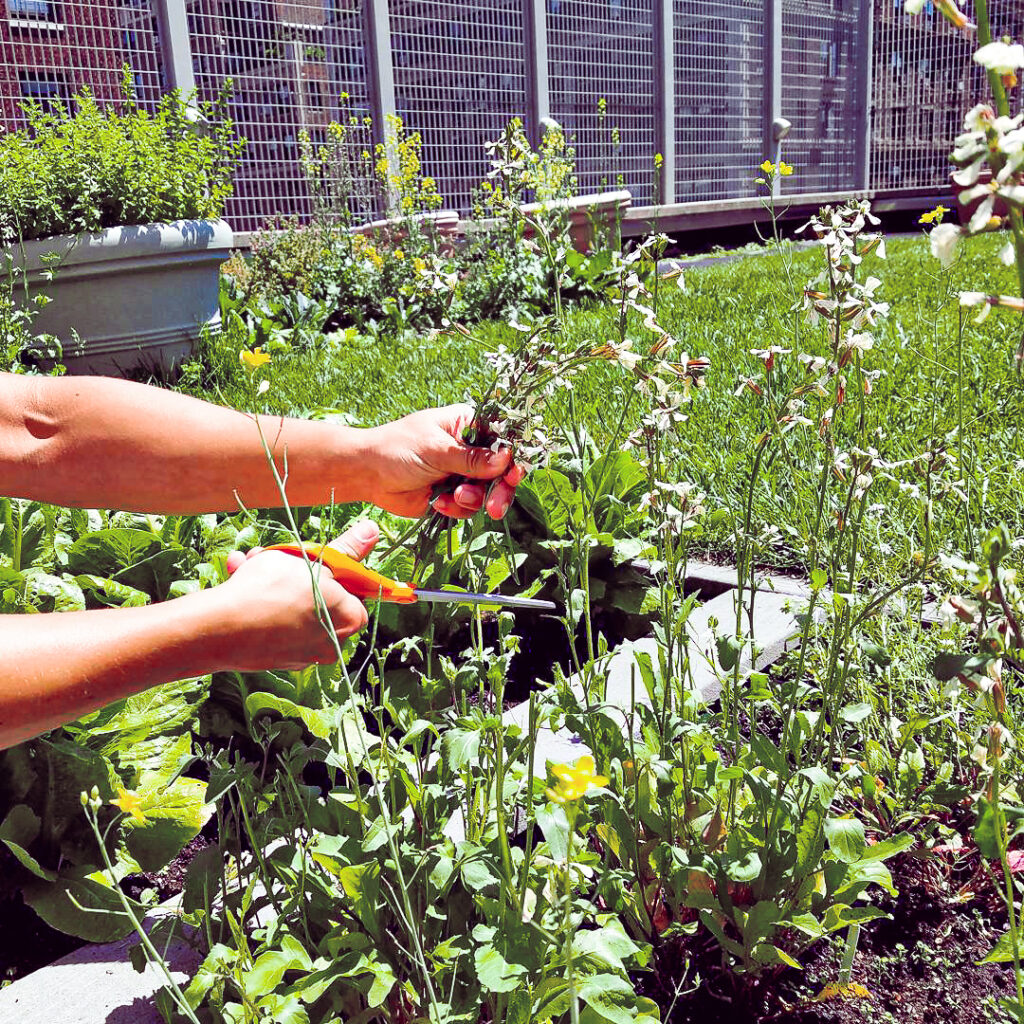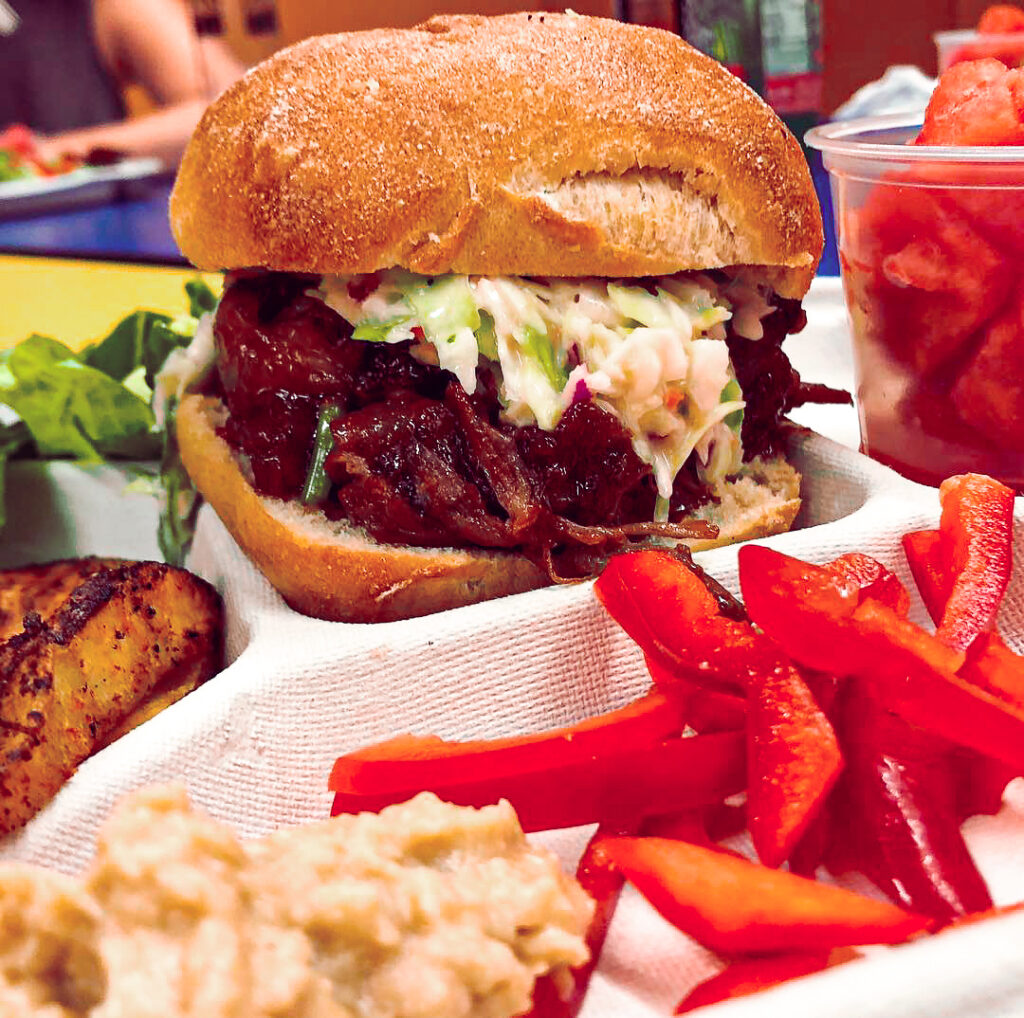I feel like I need to address the elephant in the room. I am working on my PhD and I haven’t really written much about what I’m working on. So grab a small popcorn and settle in for the 411 on my dissertation…
The backstory…
As part of my dietetic internship, I worked in the kitchen of a private school in Manhattan. Atop this school, there is a pristine rooftop garden full of fresh herbs and veggies. This garden supplies ingredients included in the scratch-cooked recipes crafted by a team of amazing chefs every day. This school blew my mind. It was unlike anything I’d ever seen or experienced, let alone knew existed in this world.
On top of the amazing school food, one morning I observed a teacher in homeroom educating his students about the Indian lunch to be served at school later that day. I discovered this was a customary practice for the teachers every morning. At lunchtime, I observed how many students were eager to eat this international cuisine. Granted, the food was absolutely delicious and freshly prepared but at the time I wondered if the teacher involvement affected the students’ school lunch excitement. At the same time I couldn’t help but feel guilty knowing that many children would never experience school food that good, or generally, food that good, ever.

It was only fitting that I got my acceptance into the doctoral program while I was interning at this school. I went straight to my advisor and told her I wanted to make an impact in the field of school food, especially for children whose only solid meal might be the lunch they receive at school. After taking some time to “review the literature” (Ph.D. speak for doing some background research) and observe school cafeterias and meals, I came to find that teachers are an untapped resource in helping children to develop healthy eating habits. So, I decided to focus my research on teachers’ role in school lunch.
My initial observations…
There are kids whose only solid meal comes from school. But let’s face it – school lunch doesn’t receive high marks. Also, levels of childhood overweight and obesity are still pretty high. Potentially this generation of children could live a shorter life than their parents. There is also a link between low-income minority children and overweight/obesity but I’ll save that for another post.
After spending some time in school cafeterias, regardless of demographic, I saw kids coming off the lunch line and tossing their trays in the garbage because it didn’t look appetizing. If the kids kept their lunch trays, there wasn’t a lot of eating going on. There was more socializing and game playing than anything else. Teachers left as soon as they dropped the kids and the lunch aides were present as supervising adult figures in the background.
I was disheartened by what I was seeing and quickly realized I would be fighting a hard fight. The research also told me teachers face a lot of barriers to including food and nutrition education in their daily lessons. They’re up against testing, time, lack of nutrition knowledge, and many other things. Some preliminary interviews with teachers confirmed these barriers but also reassured me that teachers see the value in good nutrition and also realize that kids can’t learn if they’re not nourished. “Hangriness” among students is a real thing teachers experience in many schools.
The problem and questions…
School lunch is typically viewed as a very separate part of the school day. There is very little education about food in schools these days, yet food is the basis of everything we do in life. Research shows kids’ attention and academic performance improves when they’re well-fed and nourished. Because teachers see the importance of kids being well-fed in order to learn, they wind up in a unique position to be healthy role models, encourage school lunch, and include more food and nutrition education in their lessons. But the barriers they face keep them from having an impact.

Teachers already go above and beyond for their students. In this time of COVID-19, they are working even harder to make sure kids continue with a great education. So without adding another task to teachers’ already busy plates, how do we help teachers include more food and nutrition in the classroom and encourage students to eat school lunch? What are the teachers’ views about school lunch? Given the barriers teachers face on a daily basis, how can teachers realistically support school lunch? What happens when teachers are asked to implement a school lunch-based intervention? These are questions I hope to answer when everything is said and done.
To answer those questions and others, I created a unique, multi-sensory, interactive data collection workshop for teachers. I was lucky enough to receive a grant to utilize a really innovative, educative space at Teachers College. My workshop included actors, meditative reflections, crayons, skits, food, and smells. I followed up the workshop with in-depth interviews with the teachers. I am also analyzing interviews with teachers based on their experiences implementing a school lunch-based intervention.
My goals…
With all of the data I have, I am building a story around how teachers can play a more active role in encouraging school lunch but without adding an extra burden to their days. I’m also aiming to provide a better understanding of the resources teachers need to effectively provide more food and nutrition education in their classrooms. I’m thinking of creating a professional development after my dissertation is published to boost teachers’ awareness and involvement in food and nutrition education and school lunch.
…The end…for now…
If you’ve read this far, thank you! My dissertation is actually the key to me starting this blog and social media presence. Although my dissertation focuses on teachers, parents are really the key players in shaping children’s’ health. I think when parents and teachers work together to provide continuity in healthy messaging, kids will grow-up practicing healthy habits. This is why I want to build a community of parents, teachers, and pediatric/childhood dietitians. Through food, research, and my experiences, it is my hope that we come together with open minds, hearts, and bellies and work to raise a healthier generation of children.
This was actually a really hard post for me to write because it could have been a really long post. There is actually a lot much more to my dissertation that I didn’t include. I had to keep honing this post and editing it down. Clearly this is a topic that I can go on about, and I probably will in further posts. For now, I’ll call it a day. Thank you for reading! Let me know if you have any questions. Don’t ever hesitate to reach out. Lots of love to you!
1 Comment
Back to School: Tips to Win Remote Learning - Deborah Olarte, MS RD
September 9, 2020 at 2:01 pm[…] in mind but remote learning is hard. Not to mention, I’m remote learning too! (Check out my post on my dissertation.) It’s even harder when both parents need to work while monitoring a 3-year-old on Zoom […]